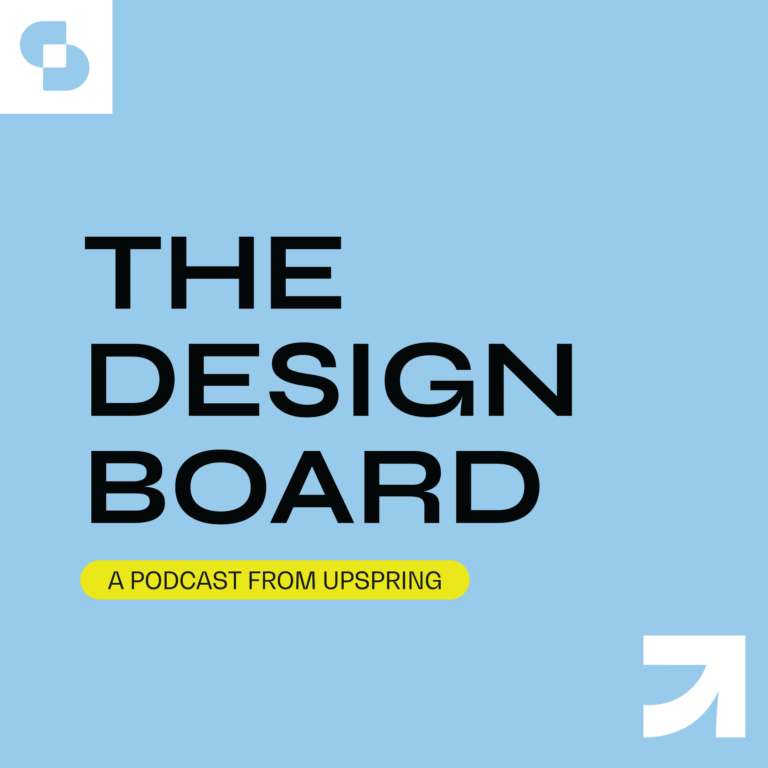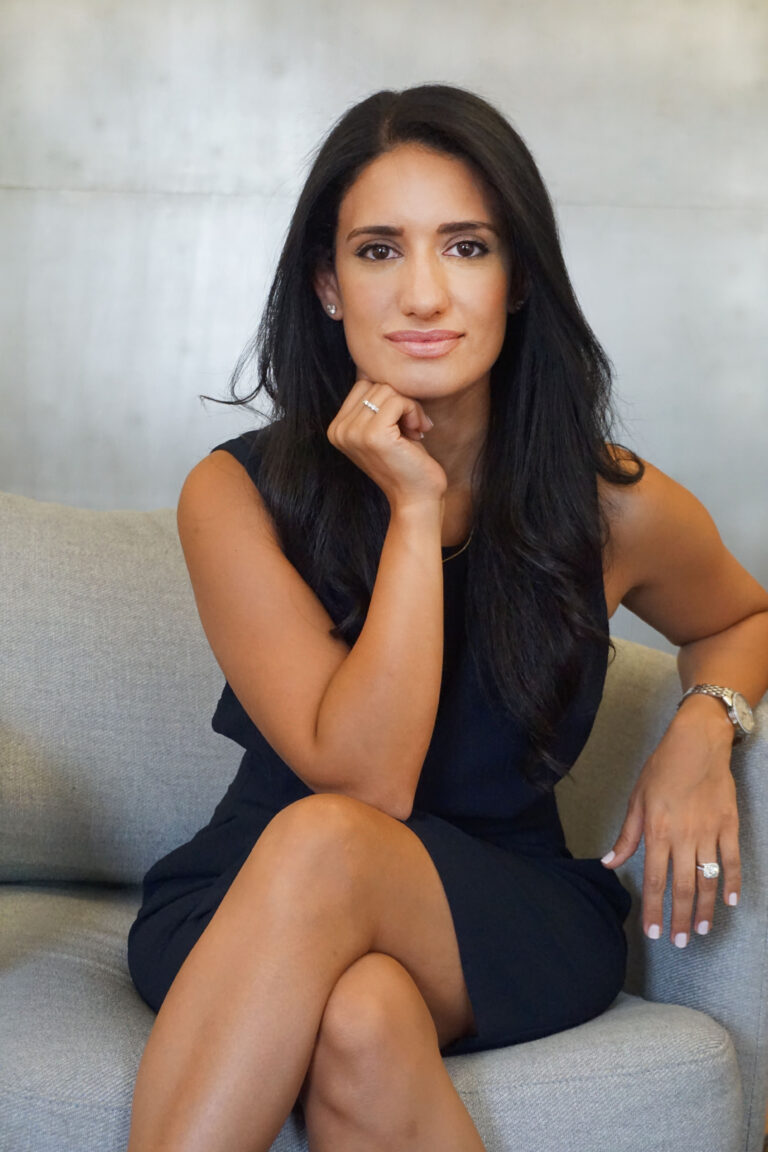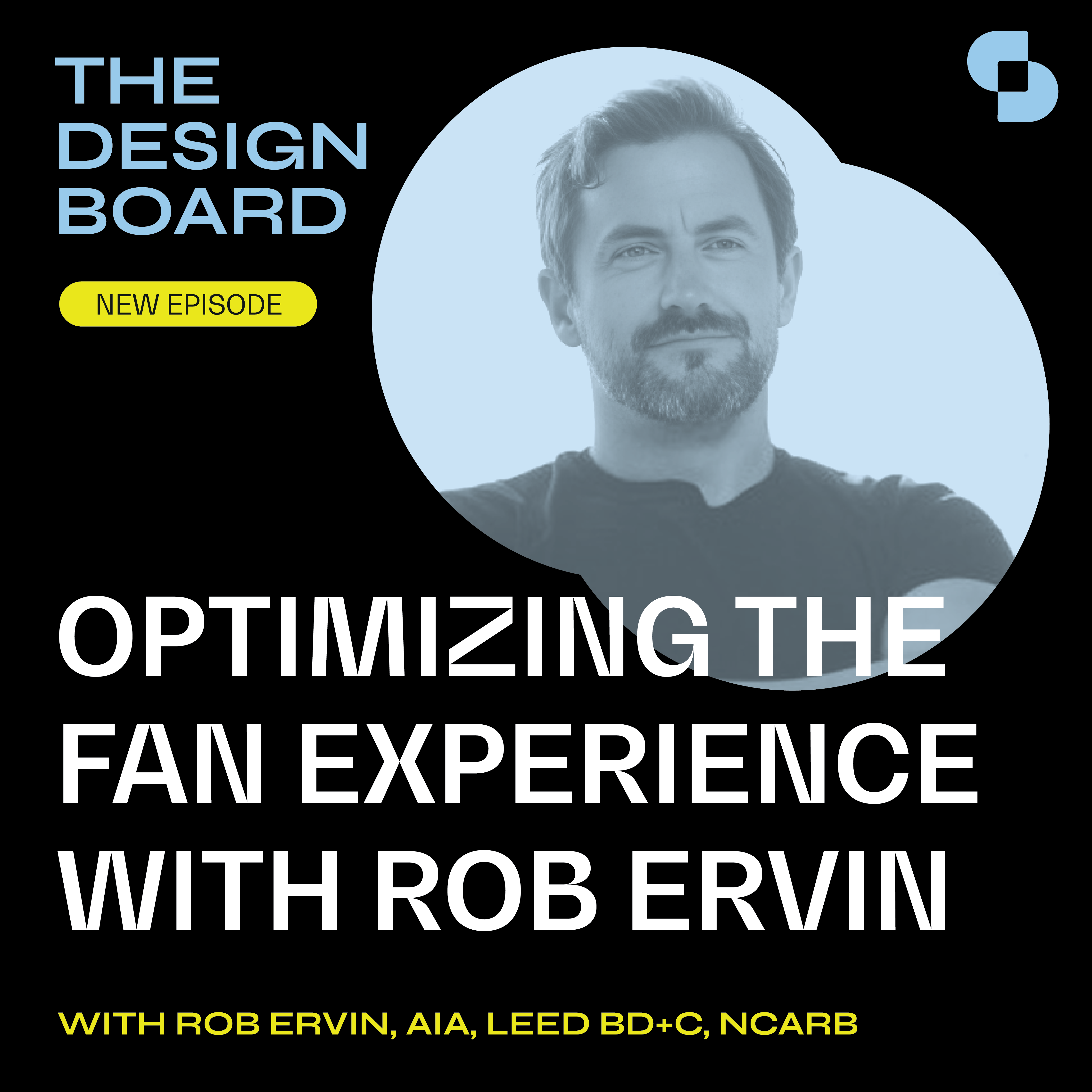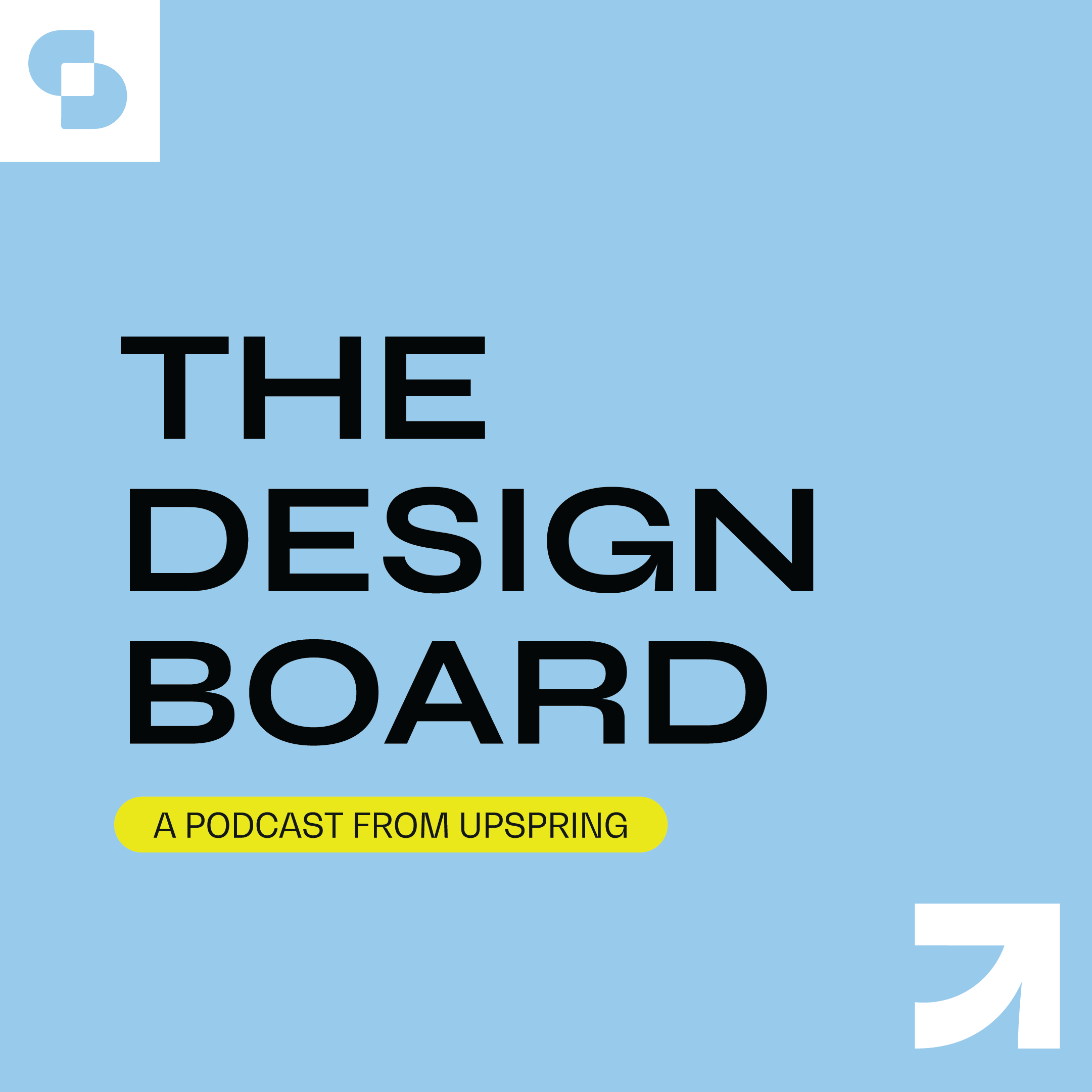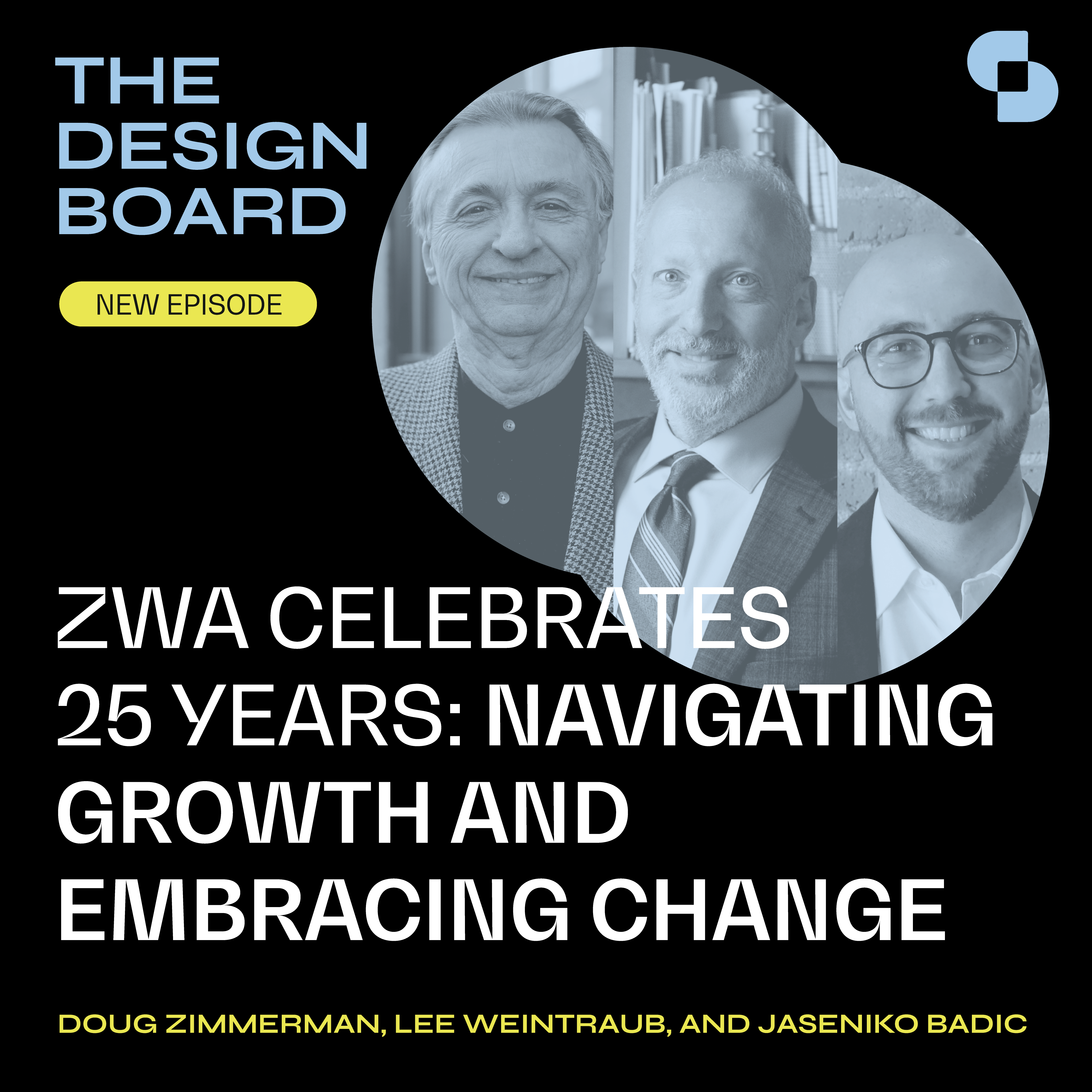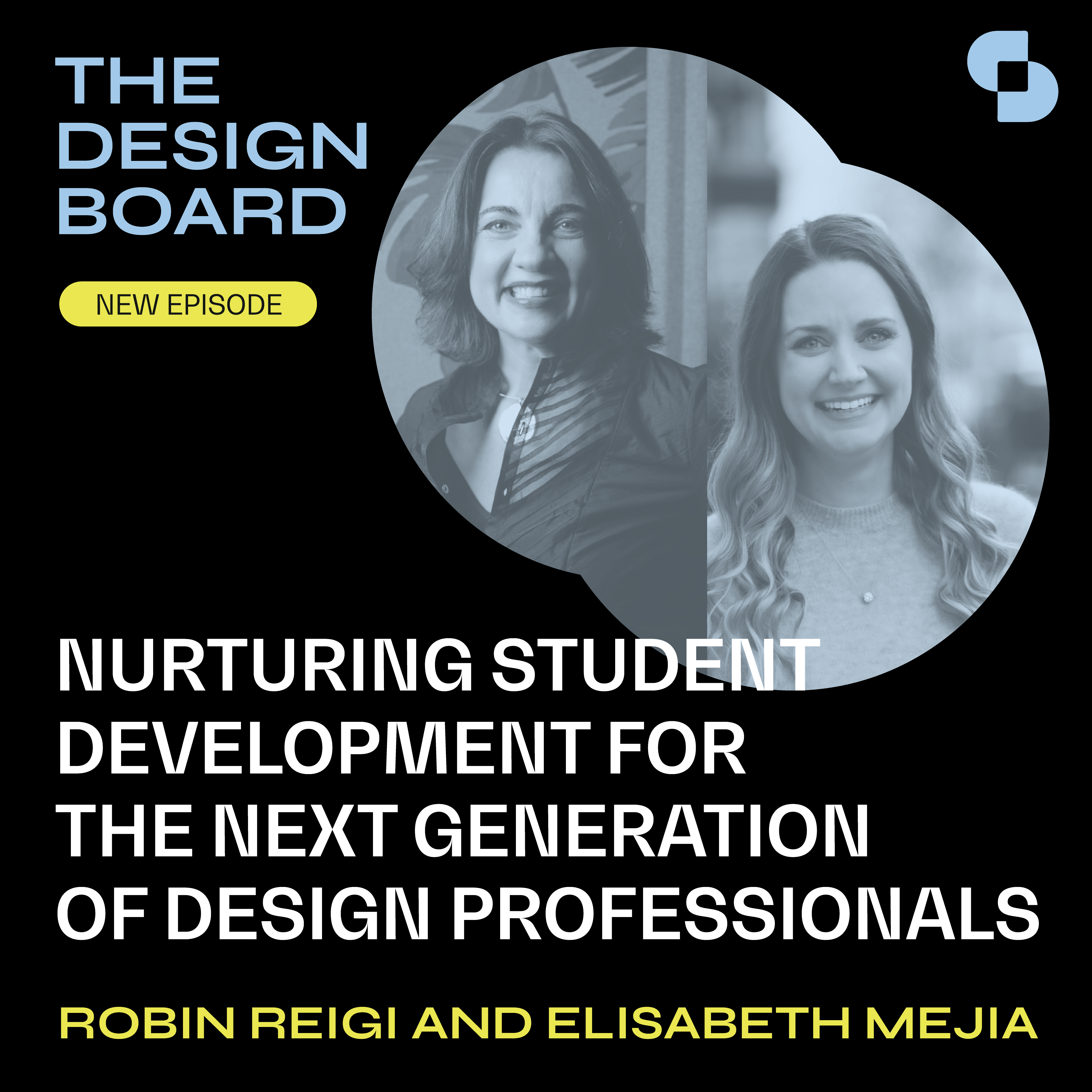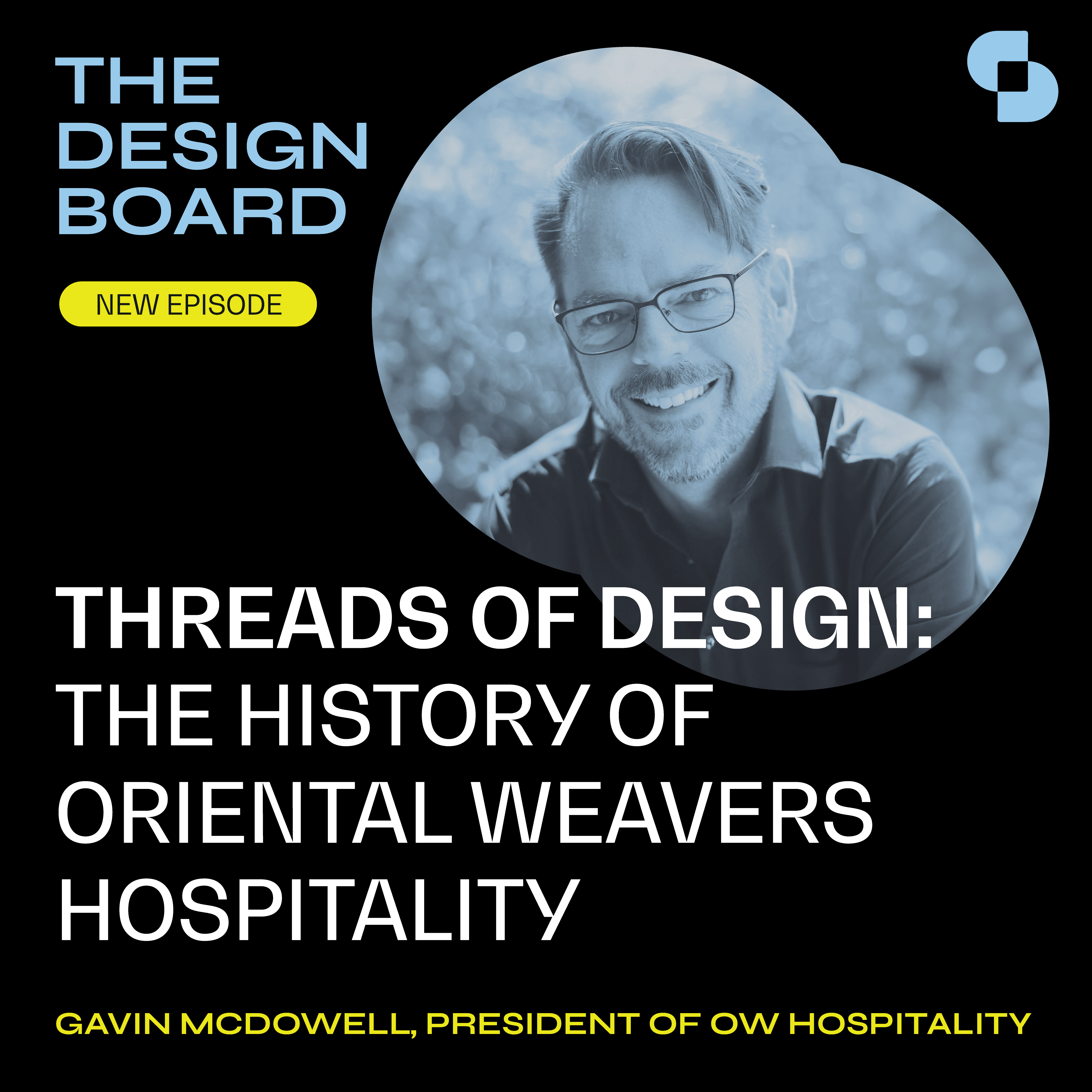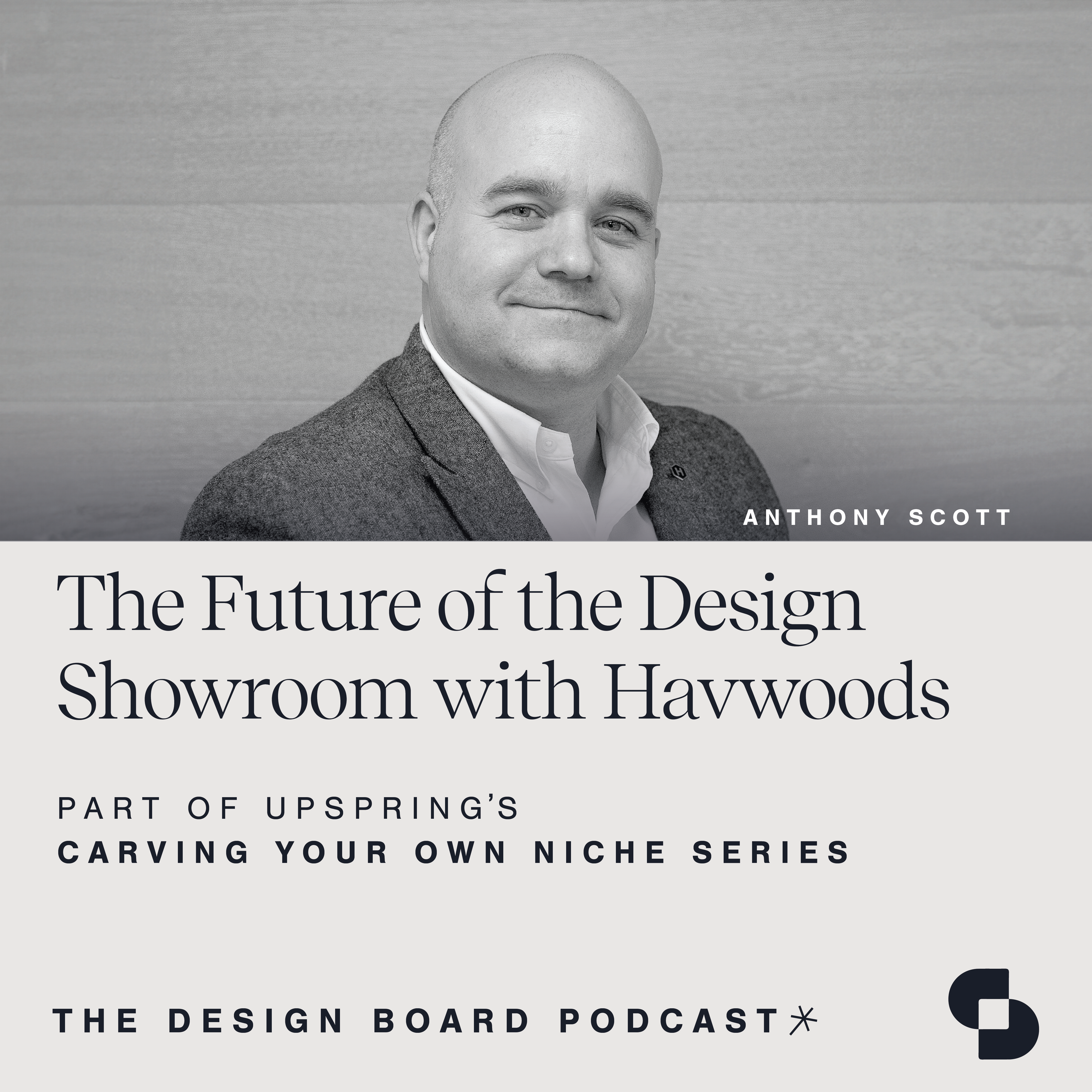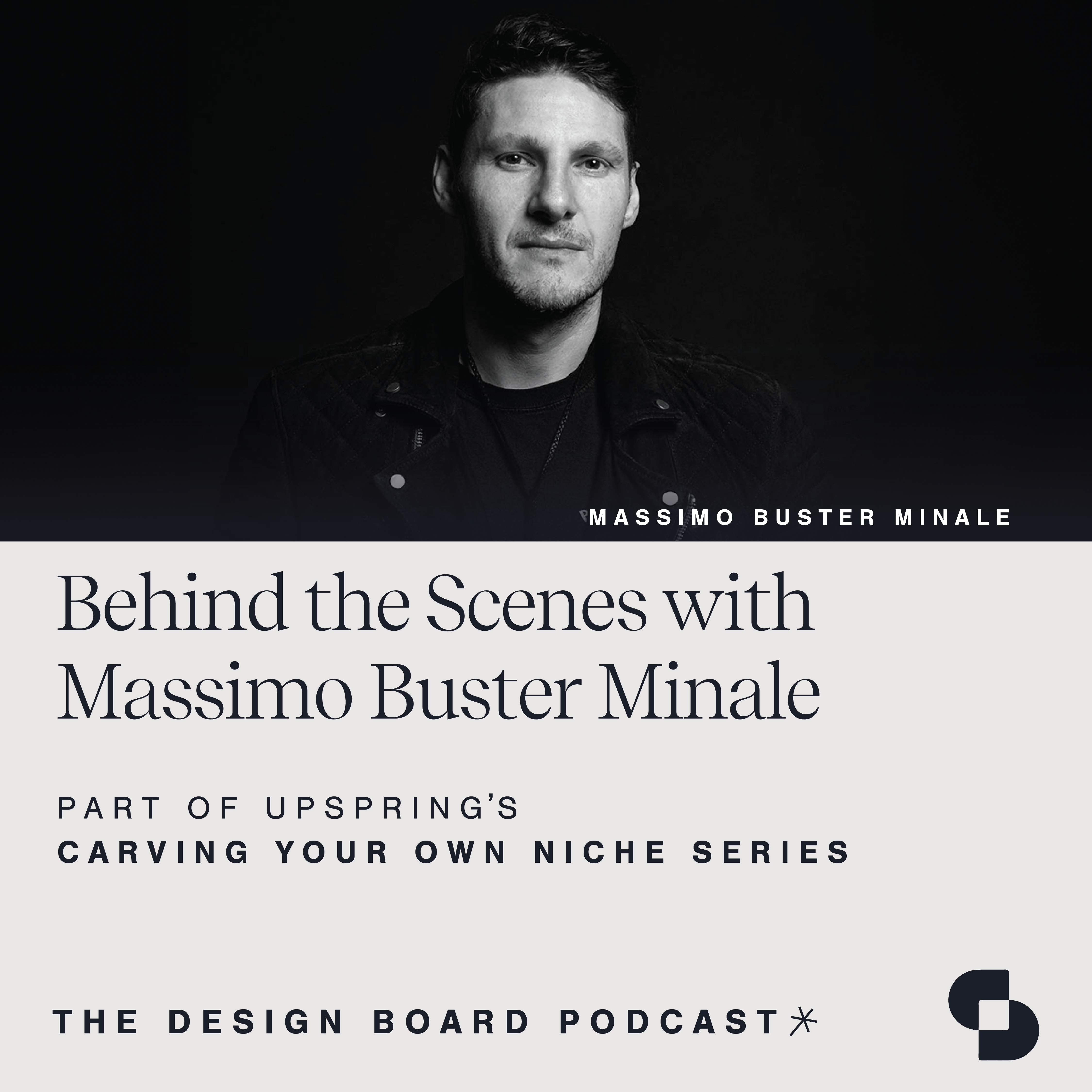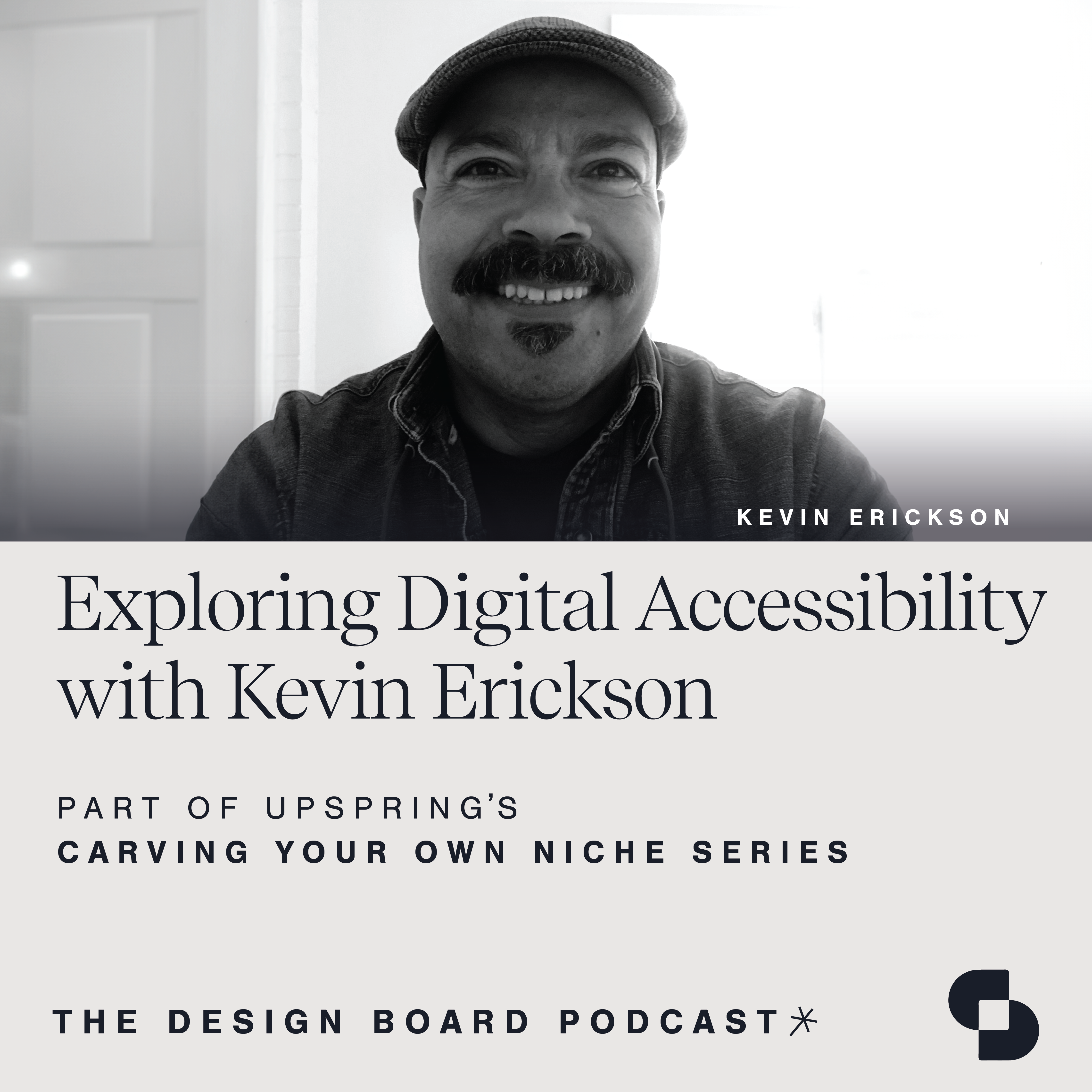B Corp certification is a third-party certification program offered by B Lab, a non-profit organization. B Corps are for-profit companies that meet rigorous social and environmental standards. Pursuing B Corp certification can be important for several reasons. In this episode, host Tiffany Rafii explores the process behind pursuing B Corp certification with Dave Shove-Brown, co-founder and partner of design firm //3877, and Gordon Boggis, CEO of Carnegie Fabrics.
Tiffany Rafii:
Welcome to the Design Board, a podcast created by the team at UpSpring that focuses on design, development, and everything in between. We invite innovators in our industry and explore topics that support your growth in every way. The Design Board is a proud member of Surround, a podcast network from Sand Out Design Group featuring the architecture and design industry’s premier shows. Check it out at surroundpodcast.com.
Today, we have two guests joining us who are going to guide us through understanding B Corp certification. The first is David Shove-Brown, the co-founder and partner of Washington, DC based multidisciplinary architecture and design firm 3877. 3877 has been named in the Washington Business Journal’s Best Places to work for three consecutive years, and is the only DC based architecture firm to achieve B Corp status. David is a recognized leader in the DC small business community and design industry at large. In addition to his practice, Dave is on the National Small Business Association Leadership Council. He’s a guest faculty member at the Catholic University School of Architecture and Planning and has conducted classes at the Corcoran College of Art and Design, leading lectures for the National Building Museum, Washington Architectural Foundation, and DC chapter of the American Institute of Architects.
Dave Shove-Brown:
Thanks for having me.
Tiffany Rafii:
Along with Dave, we have Gordon Boggis with us. Gordon Boggis is the CEO of Carnegie Fabrics. He joined Carnegie in April of 2021. Gordon has led companies across a range of industries with a strong focus on textiles, health and wellness, purpose-driven and environmentally sustainable businesses in the 20 years. Prior to joining Carnegie Gordon was CEO and board member of a number of privately owned companies, including Mission Redco Foods, Unreal Brands, and Prince Sports. At Mission, he repositioned this consumer textile company to focus on the broader healthy, active lifestyle segment. He began his career in marketing management with GlaxoSmithKline in the UK. He then held senior management roles based in the UK, Germany, and South Carolina. Thank you both for being here. We’re so excited to have you.
Gordon Boggis:
Delighted.
Tiffany Rafii:
All right, let’s dive right in. Gordon, why don’t you kick us off? What was your inspiration for pursuing B Corp certification?
Gordon Boggis:
Carnegie was founded 72 years ago on a commitment to really prove that high-performance products that are beautiful and elegant can be developed in a way which is environmentally positive. So based on that founding principle 72 years ago, it was kind of natural for Carnegie to seek the highest levels and highest forms of external authentication. So, it really was almost natural for us to gravitate towards the B Corp certification, and this is our third renewal. So, we’ve been a proud member for three business cycles now.
Tiffany Rafii:
That’s great. Dave, how about you?
Dave Shove-Brown:
Sort of similar and that yes, we wanted to talk about the products. The designs that we’re working on, but for us it was about culture as well. We wanted to look at it from sort of putting up or shutting up, putting our money where our mouth was and saying, “Okay, what is our ethos and our culture and how do we stand behind that?” Really looking at not just our team, but also who are our constituents? Who are our clients? Who are our consultants? And sort of tying that into using the B Corp as a metric, actually having a score that says, “Yes, you are actually doing the things you’re saying you’re doing.” It’s not just like, “We feel kind of like a great culture.”
This allowed us to really look inward. It also for us, it was a great opportunity to use certification as a process to sort of revisit some of the things that we were doing and say maybe we weren’t getting as many points as we wanted to in one area or another, and be able to start to have the discussion of how do we evolve and how do we continue to push our culture.
Gordon Boggis:
Yeah, I think those are great additional points. It’s a wonderful galvanizing, energizing kind of both internal and external process to go through and then kind of endorsement to have it. It really helps align values and it helps you find as an organization, other organizations, other partners who share those values consistently. So, I think those are great points.
Tiffany Rafii:
Makes perfect sense and I think part of the reason we wanted to have the two of you on today is that we know not only how much you value impact, but also how much you value company culture, growth and development. So, I think that falls right in line with what we know to be true. As it relates to certification of pretty much anything, I think anybody hears the word certification and gets a little bit scared of what that might entail. So, we’d love to have you all walk us through any advice you’d give other organizations who are considering pursuing certification challenges you faced and what you’d tell them to keep in mind.
Dave Shove-Brown:
How long is this podcast? Because we could probably go for days. I’ll jump in because we did our certification, and it took a global pandemic quite honestly for us to find some of the time to do some of these things. And it’s not a series of check boxes. It’s not something where you’re going to start it in the morning and be done within a couple of hours, but it’s no joke. It’s some serious work and there’s some due diligence in pulling information, but there’s also due diligence in conversation as far as where are we and where do we want to go.
So, my best advice or the thing that, I think is most important to talk about is you have to make the commitment to give the time to do it properly rather than just thinking like, “Oh, I’m just going to figure out some scores and just put them in here.” And through the process, using the resources that B Corp has and using the… Because you end up with an individual who basically acts as your liaison. Using that person and having open dialogue is really important, but at the end of the day, it’s just making sure that you’ve got the time to do it properly.
Gordon Boggis:
Yeah, I think those are all great points. The advice that I would give is to start by taking a deep and honest look at your company, your purpose and your values, and if you honestly and genuinely feel that you are wanting to be a force for good, you want business to be a force for good and there’s a strong alignment of your company values that people within your company are inspired by that, then go for it. Absolutely, go for it. As David said, it’s an extensive process. It’s a six-month process. It’s multidimensional. There’s a lot of work to do, but it’s worth it because it’s energizing. But start off by taking a deep hard look at yourself. So, as I said, Carnegie was founded 72 years ago on a promise to prove it could do good, be better, deliver high performance solutions that were environmentally friendly and built communities. So, if there’s alignment with your values, it might take a while, but it’s going to be rewarding, but start with that process because you have to authentically live the values of being a force for good.
Dave Shove-Brown:
I actually will say that, I think I made one mistake… Oh, I made a lot of mistakes. I’ll just going to end the sentence right there, but I think one of my critical errors in going through the process was I approached it alone. So here we are at the beginning of COVID, and this was something we wanted to do, and we had people doing various things throughout. And I was like, “Okay, well this is the thing that I’m going to jump on.” And I quickly realized that it needed to be a team effort and you needed to have dialogue and interaction with other team members to pull some of the information that you’re looking at in terms of billings, in terms of geographically where are you working, but also to just say is my understanding of our policy for this? Correct. Okay. Ironically, one of the things that we had to provide for our certification was what was our work from home policy.
I was like, “Everybody grab a monitor and go home.” I mean, is that a policy? And so, what it allowed us to do was say, “Okay, what is our formal policy now that we are already in it?” And then taking some of the team and saying, “Okay, what are some of the things that we want to craft into this?” So, I think, yes, absolutely go for it if you believe it, but I would pull some people together of varying levels and varying experiences and having some diversity to form a team to go for it is really what I would also add to Gordon’s comments.
Tiffany Rafii:
That’s great advice. Gordon, how did you all approach it? Did you have a team identified? How did process look?
Gordon Boggis:
We very much had a team, and again, we’ve been through this three times, so I guess there’s some learning that occurred on the way and I’m just lucky enough to inherit a great team that had been through it three times before. So, couple of reasons. Look, the audit, because that’s really what it is. And so, it should be spans every aspect of your business. It’s not just, “Okay, let’s have a little look at kind of one facet.” It spans the whole business and I think that’s great, and that’s sort of great strength and credit of B Corp. So, what that means is everybody needs to be involved. So, it’s great to have a cross-functional team, any project have a project leader, but have a cross-functional team and communicate with vigor because within the Carnegie organization, people are very proud that we are a B Corp and everybody who’s involved in B Corp should be very proud.
So, communicate vigorously, this is the process we’re going through. But because it does take work, it’s a six-month process, it’s 300 dimensions of questions that you need to follow up on. They’re going to be independently audited, they’re going to have request proof. Again, if you start from the point of knowing that your corporation wants to be a force for good and you can meet these standards, then involving the broader community within the company and your supply base and your partners and your customers is actually going to be very energizing. And that’s where the energy immediately oversees any kind of like, “Ah, this is work to do, this is work to do.” It just becomes very energizing. So, use the opportunity internally and with partners to talk about why you’re doing it, and I’ve found that to be a real positive within the whole process.
Dave Shove-Brown:
One thing I want to repeat that Gordon just said is thinking of it as a project, which is brilliant, and saying when you do a project, you have to allocate the right resources to the project. It’s not just a thing that just you start again in the morning, and you end after. If you plan it as any other project, you will find success.
Tiffany Rafii:
So, let’s get into the nitty-gritty. We keep talking about this process. What is the process? If you could walk us through your experience during the process of becoming certified, what are the main qualifications, any roadblocks or surprises that came your way? I think that’d be really helpful to anybody who is exploring certification.
Gordon Boggis:
It’s a survey which is 300 questions long, and it looks for impact schools on things like governance workers, customers, community environment. It talks a little bit about disclosures as well. So, I think those are really important topics in today’s business environment, governance, community inclusivity, environmental impact, interactions with customers, with suppliers. I think those are really, really important dimensions. So those are the areas that B Corp is going to want to cover. I think having gone through those areas, you get a good sense for the breadth of which the involvement is going to take within the organization. So that’s an outline of the process. Be ready for a six-month process that looks at those dimensions, looks at impact score within those different criteria and has a very logical, it’s almost like an audit process in each of those dimensions. So, it’s very rigorous, which again, I think is to the great credit of B Corp. So that’s kind of like the functional rational answer to that question.
Dave Shove-Brown:
Well, yeah, so you go through this process, there’s sort of the initial question and answer of broad brush covering all of those things, and then you get into the really detailed audit and as a part of get towards the end of the audit, you share the information with B Corp and you’re assigned somebody within the B Corp organization who basically is your liaison and is the person that you’re working with to go through all the points of the audit. What are you missing? What can you clarify this? Quite frankly, it’s a bit challenging when they’re asking for a backup for some things and you’re like, “Oh my God, I’ve got to go back to all these things.” But this is not for the faint of heart. This is not something that everybody gets to just say that they do. You earn it. And it’s really as Gordon says, it’s really, it’s invigorating.
So, what we found, which was really interesting was weren’t directly pertaining to a design firm. So, there are certain things talking about we don’t necessarily produce an end product. Our end product is a design that yes, we hope that it gets built and built in a certain way. So, it allowed us to do was have the conversation with B Corp and say, “Okay, how do we start to morph some of the audit questions to get it to work with an organization that’s got more of a professional service versus an end product?” And what I found also really inspiring was that B Corp doesn’t simply take your audit and say, “Yes, you got the points,” or “No, you didn’t get the points. Try again next year.” They say, “Okay.” And I think something to clarify on the points is each question of these… Gordon says 300, I think it’s like three million, but each of the questions has varying point levels.
It’s not something as simple as always, sometimes never. You could get two possible points or 0.4. There’s all these varying scales based on the question and based on the criteria. So, in working with B Corp and working with our advisor, there was a lot of great back and forth discussion of, “Okay, right now we’re at zero points for a question.” “Okay, you’re at zero points because you have no remote work policy. Can we do something right now? Can we work on something right now to put that together? Let’s help you do that.” So, we had open discussion with B Corp, had open discussion within our office so that we could go back and go, “Okay, now we have a policy and we’ve included it in our employee handbook.” And they go, “Great, now you get the two points.” And so, it was a work in progress, and it was very interactive and it’s not a yes and no kind of thing.
Gordon Boggis:
Dave, that’s a great point. As we went through our process, we experienced exactly the same thing. So, we’ll give some answers, we’ll complete some audits, and we’ll get a score and it’s like, “Huh, we should be doing better here, and there’s great interaction and it’s coaching and it’s guidance.” So, one of the things that we learned, particularly as it relates to employee engagement, hiring diversity was, when we get a stack of resumes in, take names off, take addresses off, take contact information off, and that’s a best practice which we could now grab hold of that we may not have thought about before. Let’s lean into giving more voluntary time off. So, let’s have more company paid time off that is focused on volunteer activity, things that we are all passionate about. And so, it’s great. Again, it’s not an easy process, but the benefits are tremendous.
And it’s not just being able to put a label on the website. It’s like, “Wow, having gone through this for a third successive time, we learn even more, and we do things better now.” And again, as you take the whole team through the process, and there is a great degree of pride within the Carnegie team because we are passionate about what we do to see the progress and be part of an organization that is being a force for good in business. It’s inspiring and energizing within the company as well. So, it’s not just an order process, it’s so much more than that.
Tiffany Rafii:
And what it’s really sounding like to me hearing two of you, is that the value is less than the certification. Maybe even less in who you are as a company when you start, but rather the journey of either doubling down on the things that already qualify you to view business in the way that warrant certification, but also a really great opportunity to improve and build upon those already those successes that are already in place.
Dave Shove-Brown:
Look, I’m a competitive person, so as soon as we got the certification, it was like celebration and we accomplished something, and immediately I was like, “Okay, what have we improved since then?” So, it’ll starting to update my score and things and see how it changes, but we very much celebrate the certification. We get it on the west, we get it on our signatures, we have it on t-shirts and mugs and all this stuff, but very much it was part of the process. But it’s also been since certification, how its framed discussion going forward, because you now have… It’s almost like you’re adding another language to your repertoire.
You now have the ability to bring into the fold in the discussion of your mission, vision and values or your discussion of hiring, your discussion of culture, this language of B Corp certification saying, “Okay, I know that as we’re moving forward, like Gordon said, with hiring.” “Okay, here’s something really simple that we could do.” But yes, it’s going to come back and help us in certification, but it’s also just part of the language that we’re now talking. And so, for us that’s been really helpful to just add that to our sort of arsenal love.
Tiffany Rafii:
There’s so much value in that. I even see when we do a team building exercise or run a feedback session with a training coach for the staff. Just the fact that you’ve introduced new language that everybody speaks on a very basic level, and this is way more thorough and intense, that even that is really uniting. Which brings me to my question about impact and the team. How do you feel like the certification has impacted your relationship with the community, with your team internally, or really just any positive impact that you’ve seen?
Dave Shove-Brown:
Well, you immediately get to know the secret handshake, which is awesome. So, for us it’s been sort of twofold. So, one is the B Corp community as a whole, which I’m going to guess based on a couple of things that Gordon said that he’s been the same, that we actually will spend time on the B Corp website and look at those other companies and go, how can we help support them? Our whole holiday gift for everybody last year was all products from other B Corp companies and local small business minority women owned things of that sort that we wanted to help support that, you became part of this community. And you’re like, “Okay, we know without knowing you at all, that we have the same core values.” So that’s that silo. The other silo is within the office of the celebration that we all said, “Yeah, okay, we are doing the things that we’re doing.”
And now we can continue to push those things and say, you know what? When it comes to that new potential client or that possible consultant or whatever, do they fit this same value structure that we’ve created? And how do we continue to evolve that value structure so that we grow as a firm and we grow as a team, talking to potential employees, talking to all of those things come from this new language. And for us, the team is very supportive, we’re super supportive of it. It’s been a great ad for us.
Gordon Boggis:
I would echo all of that. Look, I think internally it just brings a very, very strong sense of purpose. And again, look, it’s a very, very competitive labor market, talent market. Carnegie relies on innovation and a team that is committed to proving through innovation that high-performance products can be delivered in an environmentally friendly way, which is not easy, but that’s one of our founding principles. So, we are highly committed to it, and to be able to achieve that, we need talented individuals who can do that and commit to it. So, when we are looking for those types of individuals to be able to authentically say, we proved it, we live and breathe this, there’s just that strong alignment, galvanizing kind of all of our efforts. So, both in terms of energizing the current employees within Carnegie, but also hiring because it’s immediately apparent when we start to meet people, hiring is a two-way process.
And I’m talking about, look, the foundation of Carnegie is to prove the high-performance products for the commercial building market could be delivered in an environmentally positive way. We made a commitment to be PVC free 72 years ago. We hold that dear to this very day. You almost get an immediate filter. You get people who are, “We love it, we’re with you. We want to be on this train.” And some people, “Maybe not, and that’s okay. We don’t judge, but we know we need the former because it’s not easy to continue to innovate.” None of the work that B Corps do is easy work because we’re all trying to deliver better solutions than are currently available today and be a force for good. So, I think it’s galvanizing for the current employee group and it’s also a great litmus test when we go through the hiring process.
Tiffany Rafii:
That all makes sense. You two have been incredible. Thank you so much for guiding us. You’ve thoroughly terrified everybody who might ever want to pursue B Corp certification. So, in an effort to actually encourage them to do it. Just kidding. Give us one last thought.
Dave Shove-Brown:
The beauty, I think with this culture or this community of B Corp. I’m willing to bet that anybody who sees this, who thinks I want to do this could pick up the phone and call any B Corp company and that company would say, “I’d be happy to walk you through what we did and what we learned and how we did it.” I would be astonished if there was. One of my favorite stories is… Again, last year we did our holiday gifts. We found a B Corp coffee roaster in Baltimore. And not only was their team amazing, but as soon as we started talking B Corp, the woman who owns the company and immediately was, “How do we create a blend for your team and how do we create custom labels?”
And it was just like this. It was just a collaborative environment and I felt like we had known each other for years and had only talked once. And I think that there’s that community that is willing to help anybody who’s going through this to help be better and help make a difference. This is not, while I’m competitive, it’s not a competition, don’t… I’m not in it to see somebody else get a better score than me. I’m in it for us to get a better score against ourselves.
Gordon Boggis:
I would echo that. I’d like our whole industry to continue to get better. So, this isn’t about, we want to inspire others to come with us on this journey. So, I love talking to Eric at Fireclay because I’m happy whenever I meet with our client base to talk about Fireclay because it’s a wonderful product delivered by a great group of people. I want the tide for all of us to rise because Tiffany, I think to answer your last question, we have an amazing opportunity. Our industry has been a little slow to respond to a number of different dimensions, environmental, diversity, inclusion, et cetera, et cetera. We have a great opportunity, particularly in the environmental vector to make a massive difference, absolutely fundamental difference. So, let’s all go on this journey together. Let’s truly make a difference. And don’t be intimidated because B Corp, the organization other B Corps will help you through it. And it is so liberating, so rewarding, and it helps us all get one better and then we can get one better again and one better again, and pretty soon we’ll end up in a pretty amazing place.
Tiffany Rafii:
Thank you both so much for creating awareness around something so important and really outlining the challenges ahead and the opportunities that those bring. If anyone is looking to pursue B Corp certification or wants to connect with the two of you, I mean, I’d love for them to be able to, would you mind sharing how you can be found?
Gordon Boggis:
Absolutely, happy to and happy to partner to help, to guide, do whatever we can because the more commitment we have within our industry, the better on this one. So happy to share [email protected]. That’s the best way to get hold of me.
Dave Shove-Brown:
For me, it’s [email protected]. If you’re in the Washington, DC area or coming to visit, let us know and let’s meet up, have a beer, and talk about it. I’d love to.
Tiffany Rafii:
To thank you both so much for your time today. Thank you so much for listening in with us today. We hope you leave inspired by the ideas in today’s episode. For more, follow UpSpring on LinkedIn and Instagram. And don’t forget to check out the amazing lineup of shows brought to you by the Surround Podcast Network at surroundpodcast.com.

